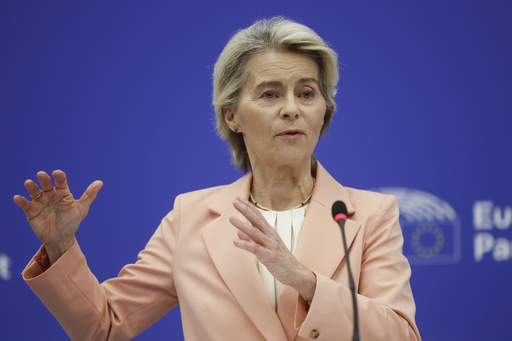European Union President Ursula von der Leyen has selected a predominantly female team for her upcoming five-year term leading the bloc, despite resistance from some EU member states regarding gender balance. In her top echelon, she appointed four women as vice presidents, including Kaja Kallas as foreign policy chief, a choice that had already been supported by government leaders. Von der Leyen also named Spanish Socialist Teresa Ribera to oversee the green transition and serve as the competition czar, while appointing Finland’s Henna Virkkunen as the rule of law and digital leader, and Romania’s Roxana Minzatu as the social affairs leader.
The confirmation of the Commission team, which skews right following the previous elections, is still pending. The selection of Raffaele Fitto, a member of Italian Prime Minister Giorgia Meloni’s far-right Brothers of Italy party, as an executive vice president is expected to spark controversy during the upcoming parliamentary confirmation hearing.
In response to criticism from French heavyweight Thierry Breton regarding alleged governance issues, von der Leyen handed the industrial portfolio to French Foreign Minister Stephane Sejourne after Breton’s resignation. Observers noted that Breton’s departure was widely viewed as a move by von der Leyen to silence one of her most vocal critics.
Von der Leyen faced challenges in achieving gender parity in her Commission team, as many EU member states initially resisted the idea. She emphasized the importance of gender balance, noting that initially only 22% of the proposed candidates were female, but after her efforts, the balance improved to 40% women and 60% men. While full gender parity was not achieved, von der Leyen ensured that women were well-represented in top positions.
Following discussions with individual European governments and political leaders, von der Leyen finalized her team composition before the official announcement. The upcoming hearings in the European Parliament will be crucial, as any candidate can be rejected, prompting a member state to put forward an alternative nominee.
Criticism has arisen over Fitto’s appointment, with some expressing concerns about having a representative of a far-right party in a leadership position within the Commission. Despite the backlash, von der Leyen defended the decision, emphasizing the need to acknowledge Italy’s significance as a founding member and major economy within the EU.
While the intricacies of the Commission’s makeup may not be widely discussed among the general public, the selection process has captivated political and bureaucratic circles. The Commission, responsible for proposing legislation and ensuring compliance within the EU, is set to commence work on November 1, though there are speculations that operations may not fully kick-off until January.
